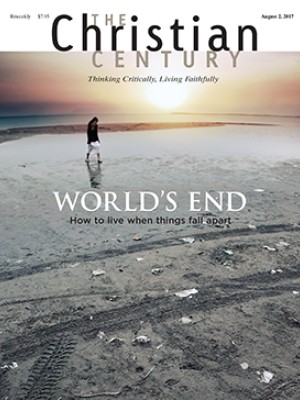Supreme Court allows parts of Trump travel ban to proceed before hearing case
(The Christian Science Monitor) The Supreme Court decided to allow President Trump to prohibit entry into the United States of some (but not all) people from the majority-Muslim countries he declares to be dangerous.
What the justices’ 9-0 ruling did not say may indicate volumes about the Supreme Court’s approach to this defining issue of Trump’s early presidency.
The high court ruling on June 26 did not try to tease out Trump’s intentions from his tweets or campaign statements. It did not make judgments about the president’s personal attitude toward Muslims. In that respect, it was different from lower court rulings that have blocked the travel ban from taking effect since the White House issued it in March.
Read our latest issue or browse back issues.
That does not necessarily indicate that Trump will win—or lose—when the court hears full arguments on the case in the fall. What it does mean is that the Supreme Court will treat him as being inherently the same as other recent U.S. chief executives. They will give him wide latitude to make judgments about what is in the best interests of national security, but they won’t cede him complete power on this question.
“They dialed down the temperature a few notches,” said Josh Blackman, an associate professor at the South Texas College of Law who specializes in constitutional jurisprudence.
It’s important to remember that the action was only a preliminary round. The Supreme Court was considering lower court rulings that had held the proposed travel ban to be such an egregious infringement on religious rights that it needed to be prevented from taking effect on an immediate, emergency basis.
The high court both agreed and disagreed with this conclusion. On the one hand, Trump can’t ban from entry anyone with a “bona fide relationship” to the United States, justices ruled. That includes people with a job, spouse, or school in the United States. On the other hand, citizens of certain Muslim-majority countries without such a connection now can be barred from entry, effective immediately. Many refugees may fall into this category.
The Supreme Court’s acceptance of the case for full consideration in the fall could set up a showdown between the historic ability of the president to set the nation’s national security priorities and the Constitution’s prohibition against discrimination on the basis of religious belief.
Still, the arguments might never happen. The travel ban’s purpose, according to the administration, is to institute a limited pause in immigration to give officials time to study procedures and decide if stricter vetting is necessary. By fall, the court may decide that the time necessary for this review has passed and pronounce the whole thing moot.
“It’s possible the court will never rule on the case,” said Lyle Denniston, dean of the Supreme Court press corps and a legal expert at the National Constitution Center.
In any event, it’s now clear that the Supreme Court is approaching the issue in a somewhat different frame of mind than did lower federal circuit courts.
Some lower court judges claimed that Trump’s tweets and campaign speeches showed that his purpose was based in prejudice against Muslims and not in a true concern to protect national security. In May, the U.S. Court of Appeals for the Fourth Circuit said the president’s revised order “drips with religious intolerance, animus, and discrimination.”
That statement is “a bit over the top,” Blackman said. Campaign statements are of necessity an exaggerated form of speech, and they haven’t before entered into a court’s consideration of presidential intentions, he said. The Supreme Court recognizes this tradition and returned to what Blackman calls a “presumption of regularity,” that this president is like any other. He won’t be treated as a unique danger who demands a unique approach to the law.
“Trump could still lose, but it’s done in regular order,” Blackman said.
Partisanship might be in play here, of course. Political leanings play a role in court decisions, from the Supreme Court to federal circuit courts and down the line.
Chief Justice John Roberts would probably disagree with that—he works hard to try and shape decisions that do not appear to have been decided along strictly partisan lines. But judges are citizens, too.
“At some level these decisions can be political,” said Carl Tobias, a law professor at the University of Richmond.
Henry Gass contributed reporting. A version of this article, which was edited on July 14, appears in the August 2 print edition under the title “Supreme Court allows parts of travel ban to proceed before hearing case”




